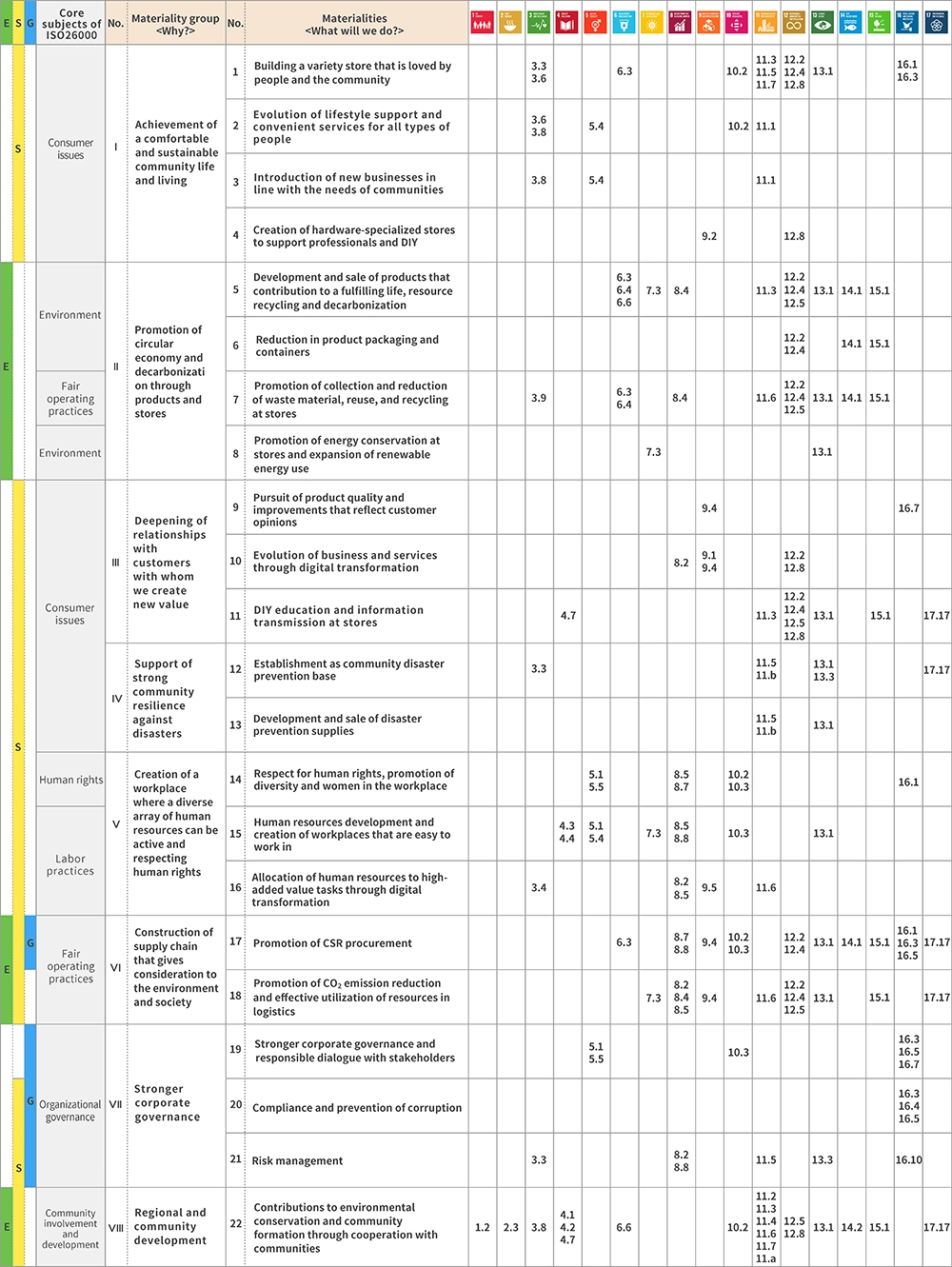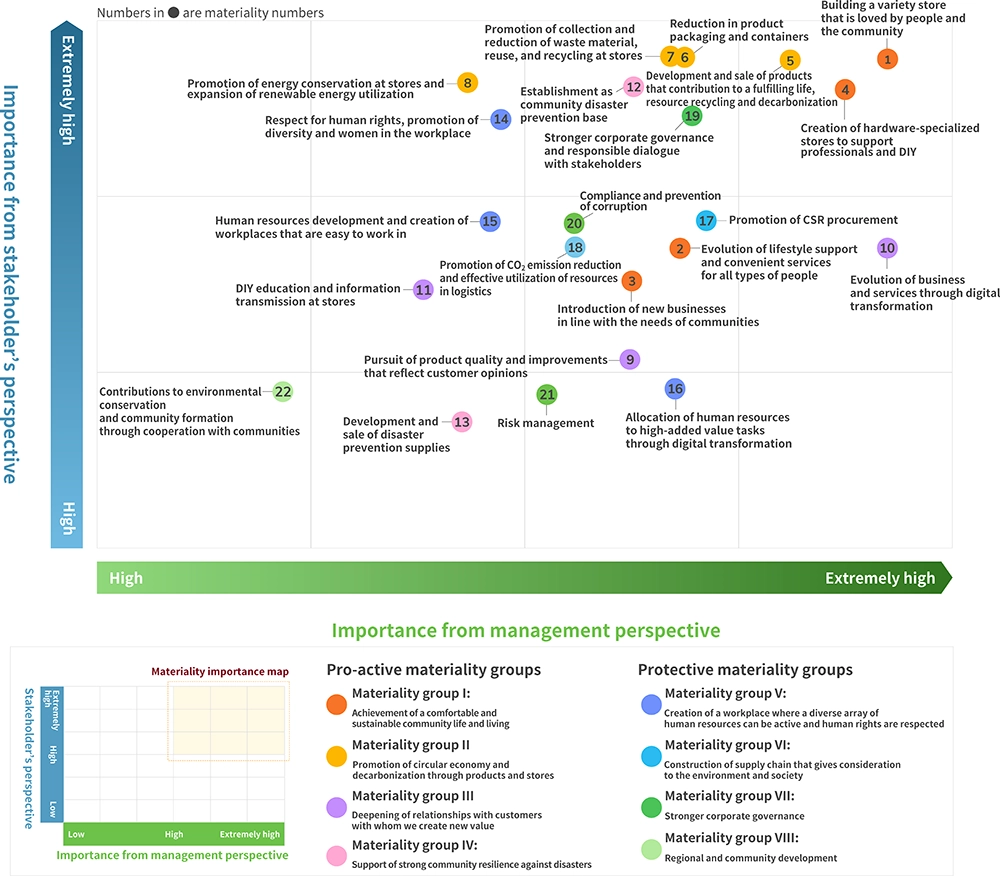Professor for the General Departmental Courses at Chiba University of Commerce, director of Sustainability Forum Japan (nonprofit organization), director of Japan Society for Business Ethics, director of Society of Global Business. Partner consultant for Nikkei BP Consulting.
Graduated University of Tokyo (Faculty of Law). Joined Ministry of Agriculture and Forestry (now Ministry of Agriculture, Forestry and Fisheries) in 1977. Deputy Director-General of the Minister of the Environment, Deputy Director-General of the Minister of Agriculture, Forestry and Fisheries, Director General of Kanto Regional Forest Office, retired in 2008. Joined Ito En, Ltd. the same year Functioned as head of CSR/SDGs promotion at said company from the position of director/managing executive officer until 2019.
Professor for the General Departmental Courses at Chiba University of Commerce from April 2020. Doctor of Policy Studies.


Materialities
Towards the achievement of a sustainable society and the growth of our corporate value, we have designated eight materiality groups and 22 materialities through internal deliberations and discussions with our stakeholders.
With a medium to long term perspective that sets its eyes on 2030, we have identified threats for and opportunities to DCM that are going to come through societal issues, and have clarified our approach both towards our growth as a company and towards making contributions to the resolution of societal issues. We are aiming to be a value creating business that achieves a more comfortable life and living through DIY
The Eight Materiality Groups of the DCM Group
Achievement of a comfortable and sustainable community life and living
In Japan, the population is aging and the birth rate is declining. Rural communities are being depopulated through migration to cities, and it is becoming harder and harder to obtain daily necessities. Additionally, while buildings continue to age, the number of laborers is insufficient and we imagine it is going to become more and more difficult to both construct and refurbish homes.
At DCM, we are aiming at a future where people can feel at ease anywhere they live, and we are working to evolve all of our domestic stores from current general home improvement retailers to those that are either (1) “Lifestyle Variety Store” with a variety of daily necessities for life that correspond with the needs of the community or those that (2) are specialized for home repair and improvement that provide support making it easier for professionals to work and that are specialized with regard to hardware (tools, metal fittings, work supplies, etc.) to support DIY by regular people.
As Lifestyle Variety Store, we are aiming to be community-based, comfortable stores that are indispensable to the community. Stores serve community purpose, propose and sell daily necessities, convenient products and products that can accent fulfilling lifestyles while offering barrier-free experiences and a space for exchange between local customers who support one another in their lives. This will enrich lifestyle support services for people who have trouble leaving their homes, such as the elderly, and for families where both parents are working. Additionally, we are reinforcing functionality of the stores even further in anticipation of becoming a disaster prevention base that can offer relief goods in time of disaster. We are also working to introduce new businesses that are in line with the differing needs of each community.
Stores that are specialized with regard to hardware largely fall into two business categories. First is Hodaka, which is specialist store aimed at professionals that has an abundant supply of hardware products. We actively open these stores in communities where we estimate high demand and enrich our quality and service network as a store that is indispensable to professionals. Secondly, we will have at least one home improvement megastore in each area that will serve as a comprehensive base for home improvement products and culture. These stores will offer a great range of hardware products, and each of them will act as a space that offers both DIY-related exhibitions and experiences for ordinary people.
- SDGs that are primarily related
-
- Other SDGs that are related
-
Promotion of circular economy and decarbonization through products and stores
We believe that we have a responsibility as a corporation to make contributions towards the resolution of global societal issues such as climate change and the depletion of natural resources through our business. We are progressing initiatives aimed at a circular and decarbonized society both through our products and through our stores.
Through our own in-house “DCM Brand” products, we are rapidly developing and offering products that make contributions to the resolution of societal issues, such as resource circulation, waste reductions, improvements to water quality, prevention of oceanic pollution, energy efficiency, CO2 reductions and forest preservation. Additionally, we are also revising product packaging and containers from the perspective of reducing our environmental impact.
At all of our over approximately 840 domestic stores, we have begun gathering and recycling plastic and other waste based on the Plastic Resource Recycling Promotion Law enacted in 2022. We are aiming to become a community base in the effective utilization of resources by engaging in recycling together with our customers. Additionally, we are reducing, reusing and recycling the waste from materials and equipment used at our stores, by reusing the packaging and palettes used in shipping products for example.
Further, we are working to operate our stores in an environmentally-friendly manner by conserving the energy we use at our stores.
- SDGs that are primarily related
-
- Other SDGs that are related
-
Deepening of relationships with customers with whom we create new value
At DCM, we value product development that is done from the customer’s point of view. We are always asking ourselves, “What is going to provide real value to our customers?” Our own in-house DCM Brand products that we have at every single one of our approximately 840 stores nationwide have the necessary functionality and optimal pricing to support the daily lives of customers, the differing needs and lifestyles of households, and the cultures and traditions of each community. The valuable products we want to bring to customers are those which have both a quality you can be satisfied with and a price you find reasonable. This is why we are going to strengthen our ability to develop products unique to DCM that give consideration to people and the environment and that can be found nowhere else, while developing and continually reinforcing an inspection structure that starts from the product planning stage where quality management members are unified. And, we ensure that we are utilizing the incredibly valuable asset that is the opinions we have heard from customers in the improvement of products.
Additionally, at DCM, we believe that the essence of digital transformation is getting to better know our customers. We are working on an omnichannel platform that combines the benefits of stores and e-commerce, next-generation web solutions that will allow us to suggest solutions for vaguely conceived issues our customers may be facing, and services that further utilize digital transformation and reinforce information transmission.
In addition to this, we believe that DIY is inseparable from sustainable lifestyles that allow us to use things with good care and over the long term. To further the spread of DIY, which will allow customers to achieve living that is fulfilling and comfortable in their own unique way for a variety of lifestyle scenes, we are going to teach people about the significance and fun of sustainable lifestyles, as well as the know-how and how-to needed to do DIY through our stores and the internet.
- SDGs that are primarily related
-
- Other SDGs that are related
-
Support of strong community resilience against disasters
DCM believes that one of the major roles of home improvement stores is disaster prevention, and we aim to be a presence that is able to be the first to provide support for resilience in the event of any disasters in the community and adjacent regions.
While our stores naturally sell supplies for disaster prevention that all households should have on hand at all times, they also stock a wealth of goods required to support daily life immediately after a disaster. Furthermore, our stores and our product distribution centers that are located in each region have stocks of supplies, and have in place a supply structure for any emergency. As part of our normal activities, DCM also undertakes disaster prevention awareness raising activities at stores around Japan, regional events, and other such venues as well as disseminating information online.
- SDGs that are primarily related
-
- Other SDGs that are related
-
Creation of a workplace where a diverse array of human resources can be active and respecting human rights
We promote diversity and inclusion to respect human rights and diversity and so that staff with diverse backgrounds can accept one another and work together energetically in the same fields. In particular, we are putting focus on women in the workplace at DCM, actively providing career guidance through various types of training. One of the issues we face moving forward is how to increase the number of female managers and how to reflect a greater diversity of values in decision making.
At our stores, we are making progress in the automating and streamlining of work through digital transformation and working to decrease the burden on our employees. Through this, we are aiming to increase the amount of time employees can interact with customers, and to turn our employees into service professionals. To reinforce these initiatives, we are working hard to develop human resources. Additionally, while promoting “health management, we are also working to create a workplace that is easy to work in by providing support for flexible work styles that are in line with a variety of life plans, such as childrearing and nursing, and reinforcing service and benefit programs.
We believe that employee happiness is tied to customer happiness. So, we are aiming to create a workplace that makes all those involved with DCM happy.
- SDGs that are primarily related
-
- Other SDGs that are related
-
Construction of supply chain that gives consideration to the environment and society
Action is required across the supply chain as a whole in order to tackle the challenges faced by society, such as climate change and ensuring respect for human rights. DCM has created a code of conduct from the perspective of the environment, human rights, labor practices, and compliance, and works to ensure CSR procurement by requiring all business partners to comply with it, including product suppliers and manufacturers and contract manufacturers for DCM brand products.
We pay attention to “white logistics” in our domestic operations, and work to reduce CO2 emissions and the burden on our drivers by re-examining our delivery routes, improving loading efficiency, reducing transport distances, and initiatives for joint delivery with shared delivery trucks. We are also working on “last mile” initiatives to improve efficiency in logistics by combining product deliveries from customers’ local stores. Furthermore, in our overseas logistics, DCM works to streamline logistics operations and reduce the load on the environment through extensive use of what is known as buyer's consolidation, in which multiple shipments from different suppliers in an originating country are compiled into one cargo shipment.
In deliveries to our stores, we streamline our work through initiatives such as delivering products for stores for each individual aisle, while striving to reduce waste by using reusable folding containers, roll pallet cages, and frame carts, and by effectively utilizing and recycling logistics packaging materials.
- SDGs that are primarily related
-
- Other SDGs that are related
-
Stronger corporate governance
The effective functioning of corporate governance is vital as the foundation of a sustainable business. To revitalize directors and increase their efficacy, we are promoting initiatives for the construction of an even studier corporate governance system by, for example, expanding the content of deliberations, increasing the ratio of independent external directors and ensuring diversity.
Additionally, through transparent, responsible discussions with stakeholders, and through conducting business activities that are in line with the needs of society, we are aiming at long-term improvements to our corporate value.
Regarding compliance and prevention of corruption, we are drafting and revising basic policies that are in line with societal norms and revisions to laws and regulations and are increasing awareness related to the observance of laws among employees.
Regarding risk management, we are working to strengthen our ability to respond to any and all risks, such as climate change, information leaks and natural disasters. Regarding climate change in particular, we are utilizing the framework of the Task Force on Climate-related Financial Disclosures (TCFD) proposals and looking into countermeasures towards climate change while disclosing information.
- SDGs that are primarily related
-
- Other SDGs that are related
-
Regional and community development
DCM is engaging in a variety of societal contributions, such as environmental preservation, disaster prevention, welfare, educational support, beautification and cleaning of the areas around our stores, and community support. “DCM Forest Creation” (tree planting) is one of them, through which we make contributions to the recycling and reuse of forest resources all over the country. We believe it is our responsibility as a company that sells many wood processing products to further strengthen these tree planting initiatives, which will also make contributions to CO2 reductions. Regarding disaster prevention, we are forming agreements with municipalities to provide support in times of disaster and are providing education at stores and community events.
- SDGs that are primarily related
-
- Other SDGs that are related
-
Materiality ESG/SDGs matrix

Materiality ESG/SDGs matrix
Materiality importance map

Materiality designation processes
Analysis of current state and extraction of candidates for materialities
From FY2021, activities of the cross-company SDGs Promotion Taskforce were stepped up. SDGs initiatives in the DCM business process are combined with core measures for our medium-term management plan and long-term business vision, and we have comprehensively taken inventory of value at DCM from an SDGs perspective. The 336 items we originally discovered were then meticulously organized and condensed to 22. Further, we tied the 17 goals and 169 targets in the SDGs with the international ISO26000 standard, which is related to an organization’s social responsibilities.
Evaluation of the priority of materiality candidates
The 22 items discovered in Step 1 were treated as materiality candidates for DCM. Further, each materiality candidate had its importance evaluated from the perspective of management and from the perspective of stakeholders. After management perspective evaluations went through mutual recognition and improvements were conducted via management based on the results of investigations by the SDGs Promotion Taskforce, discussions were held among the company president and other top management executives. Stakeholder perspective evaluations were conducted through surveys of our business partners and other related parties, while exchanging opinions with regard to what is expected of DCM in relation to sustainability. We comprehensively judged the validity of the evaluations based on these results and established importance for the materiality candidates. Additionally, we created a materiality importance map that allows for the visual judgement of the importance of materiality candidates.
Opinions and evaluations from outside experts
We held a meeting between an outside expert, Hidemitsu Sasaya, and DCM management to discuss the materiality candidates we set, their importance and verified the validity thereof.
Decided via management conference and Board of Directors
The materiality candidates were discussed at management conferences and amongst the Board of Directors and were settled as 8 SDGs materiality groups and 22 materialities.
Third-party opinions from experts with regard to materialities
Doctor of Policy Studies, Professor at Chiba University of Commerce

SDG-oriented management is taking root, and the number of companies and organizations that embrace it is rapidly expanding in the last couple of years. This is as it will be useful in the “transformation” mentioned in the title of the United Nation’s SDGs agenda,
“Transforming our World: The 2030 Agenda for Sustainable Development.” We are in the “●X” age. We believe that it is important to implement SX (Sustainability Transformation) through the synthesis of the five Xs that are CX (Customer Experience), DX (Digital Transformation), GX (Green Transformation), HX (Human Transformation) and D&IX (Diversity and Inclusion Transformation). It is becoming more and more necessary that we utilize transformative, future-oriented SDGs in all aspects of management (people, things, money, information). While many companies have been sitting on the sidelines until now, DCM Holdings rapidly established an SDGs Promotion Taskforce centered around the PR and CSR Office and organized the elements of the five Xs. What is important moving forward is to thoroughly incorporate these into your primary business.
There are many DCM Group projects that seem to be directly tied to SDGs, such as hygiene and lifestyle cleanliness, aftercare for consumers, aiming to become a home improvement retailing business that is vital to communities and workplace reform. In the materiality importance map, you can see a number of materialities in the upper right-hand corner. The items are detailed, and we can also evaluate them as being linked to internal projects.
The eight materialities may seem conventional, but they are well-organized and useful as they are easy to apply to work details. One big advancement was that this ESG/SDGs matrix is detailed down to the level of key targets. As awareness surrounding SDGs has become more acute, distinctions cannot be made at the goal level.
First, it is important to establish how to communicate the specified materialities and their matrix outside of the company. If you can convincingly portray yourselves as an SDGs management company that is thorough in governance and implementing the SDGs across all aspects of E, S and G, this will increase your appeal to investors from an IR perspective.
Additionally, as there are more and more SDGs companies among DCM Group’s partners that produce daily necessities and parts, this will attract and persuade them to sell with DCM through an SDGs alliance. If you become a conglomerate of SDGs allies, this will tie into working together to develop sustainable products and floors. If these advanced initiatives become widely known about, proposals from other companies will gradually start to come in. Your company will function as the base for a virtuous cycle and become more and more innovative. This will be the effect of SDGs 17, “Partnerships for Goals.”
Moving forward, as the DCM Group’s own unique proposal towards the carbon neutral era, one method would be to extract the item groups related to decarbonization from the materiality importance map and to brand those as a “Carbon Neutrality Package.” You can stand out as a company by focusing on carbon neutrality, organizing that into the three groups of client-focused, customer-focused and internally focused and then accurately brand that as being tied to SDGs 13, “Climate Action.”
You should also utilize the brick-and-mortar stores you have all over the country. As a result of the COVID-19 pandemic, the sense of values customers have is now oriented towards sustainable lifestyles, and DIY is getting a lot of attention. You should invite a sympathetic response from customers by using the SDGs to ensure that DIY is in line with their awareness. Additionally, for example, the sustainable farming in SDGs 2, “Zero Hunger” can be tied to agriculture and gardening sales area. In this way, you can brand your company’s home improvement retailers as being relevant to many SDGs items and advertise that. This will serve as an opportunity to accomplish SDGs 4, “Quality Education,” with regard not just to your employees but also to the part-time employees working at stores.
Additionally, internally, ensure that you understand the materialities in more depth and help them take root. It will make it easier for each employee to realize what SDGs a project is tied to, and it will increase awareness that SDGs are being accomplished through daily work. In particular, as there are many young people who want to do something that is socially meaningful, it should help you in the acquisition of talented human resources.
The importance of sustainability moving forward is going to become even greater to the DCM Group when you opt in to and apply for the prime market, a new markets division of the Tokyo Stock Exchange. I advise you to have SDGs core to management and to start early in constructing a business model that ties this into profits.
Materiality targets/KPI
The DCM Group is drafting goals and KPIs with regard to materialities. We will introduce them and how we are making progress in each of them.


